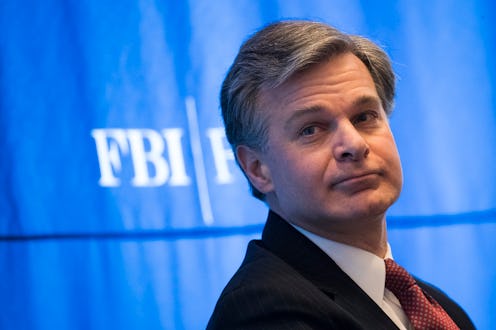News
How The FBI Totally Dropped The Ball On Stopping The Florida Shooting

A notable detail came to light Friday regarding the deadly school shooting at Stoneman Douglas High School in Parkland, Florida. Namely, the FBI got a tip about the Florida shooter in early January — but the agency also publicly acknowledged that it failed to observe its own protocols that would have made sure someone followed up on that tip.
In the days following the shooting, in which a gunman killed 17 people, people in law enforcement and politics alike have been trying to get to the bottom of precisely what happened and whether anything could have prevented it. Now, Florida Governor Rick Scott is calling for FBI Director Christopher Wray to resign in the wake of this latest news. Scott says the bureau's failure to fully investigate the tip it got last month merits Wray leaving his job.
"The FBI’s failure to take action against this killer is unacceptable," Scott said, in a statement.
According to Axios, the tip reportedly came from a person close to the gunman, and it was sent through the bureau's Public Access Line (PAL). In a statement on Friday, the FBI acknowledged that the information was not handled properly, and said that the tip was never provided to the bureau's Miami field office. "Under established protocols, the information provided by the caller should have been assessed as a potential threat to life. The information then should have been forwarded to the FBI Miami Field Office, where appropriate investigative steps would have been taken," the FBI's statement said.
"We have determined that these protocols were not followed for the information received by the PAL on January 5. The information was not provided to the Miami Field Office, and no further investigation was conducted at that time," the statement continued.
The tip in question alerted the FBI to the fact that the Parkland gunman owned guns and had expressed a desire to kill, and even more specifically, to commit a school shooting. The gunman reportedly wrote a YouTube comment last September claiming he wanted to "be a professional school shooter."
"The caller provided information about Cruz’s gun ownership, desire to kill people, erratic behavior, and disturbing social media posts, as well as the potential of him conducting a school shooting," the FBI's official statement said.
It's worth noting that there's no evidence to suggest Wray personally knew anything about the tip last month, at least not yet, as the reported breach in protocol and failure to follow through occurred below the level of the FBI director's office. Regardless, Scott has been unsparing in his criticisms of Wray and the FBI since this news broke; he's insisted that apologies are not enough, and that the public needs to believe that reporting suspicious or threatening behavior will be taken seriously.
"Seventeen innocent people are dead and acknowledging a mistake isn’t going to cut it. An apology will never bring these 17 Floridians back to life or comfort the families who are in pain," the statement from Scott said.
“We constantly promote ‘see something, say something,’ and a courageous person did just that to the FBI. And the FBI failed to act," the statement continued. "‘See something, say something’ is an incredibly important tool and people must have confidence in the follow through from law enforcement. The FBI Director needs to resign.”
It's unclear whether the demand will have any effect on Wray's ongoing tenure atop the FBI. The bureau has already been under scrutiny and pressure from the Trump administration and conservative media outlets, owing in large part to the ongoing investigation being conducted by special counsel Robert Mueller. At the time of this writing, President Donald Trump has yet to weigh in on the FBI's role in the case.